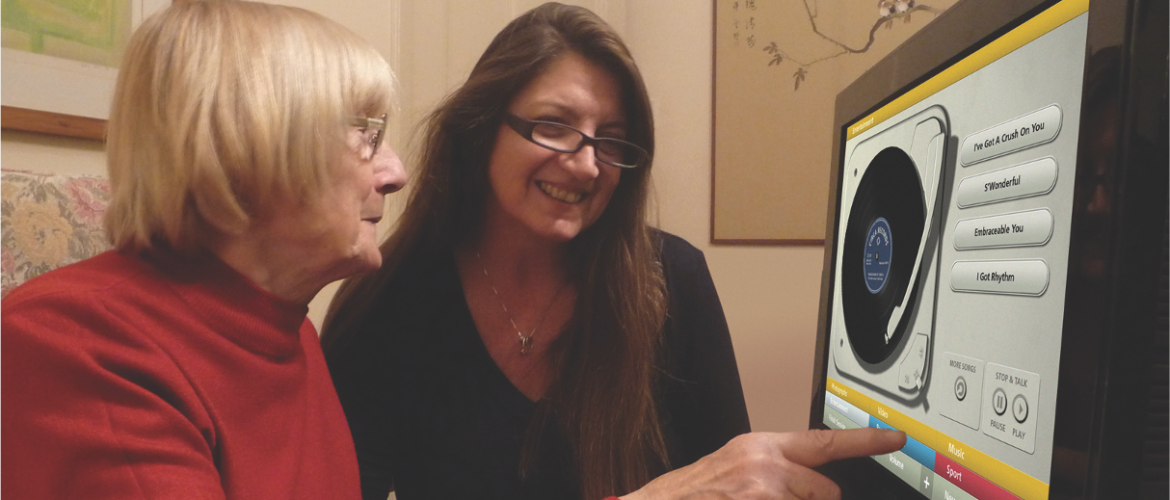CABHI recently selected 24 projects to participate in Spark-ON and Spark-CU, subsidiaries of the Spark Program which support the development of grassroots solutions by frontline healthcare workers and researchers to solve real-world critical care challenges.
The Centre for Aging + Brain Health Innovation (CABHI) launched its Spark-ON program just months after COVID-19 was declared a global pandemic. Through Spark-ON, CABHI invited frontline care workers, clinical managers, and clinical researchers to submit an innovative, COVID-19-related idea aimed at improving the lives of older adults, persons with dementia, and their care partners. The program was part of CABHI’s rapid response to the pandemic and acknowledged frontline care workers as uniquely positioned to address the needs of Ontario’s older adult population during the current health crisis.
The Spark-ON program is designed to address the current healthcare needs of older adults. The Spark-CU program was launched to help Ontario students – Canada’s future innovators – scale their innovative aging and brain health solutions into businesses.
Through Spark-ON and Spark-CU, CABHI will invest close to $1 million in support of these 24 projects, which range from water intake initiatives to intergenerational learning and digital literacy skills development for older adults. While unique, each project shares a common goal: improving the quality of life for older adults, people living with dementia, and their caregivers during the pandemic and beyond.
Read about the 24 projects below!
Spark-ON: Pandemic Response
Virtual micro-credentialing for unregulated care providers
Project Lead: Faith Boutcher
Organization: Baycrest (Toronto, ON)
The COVID-19 pandemic has revealed the growing need for education addressing the healthcare of older adults. This project will refine a 12-week part-time micro-credentialed certificate designed to teach the basics of geriatric care to unregulated healthcare providers (i.e., healthcare aides, private companions), and assess the benefits and educational outcomes of a virtual 12-week certificate program. The course will be delivered through an established virtual learning platform (ALPHA), which uses a simulated educational environment to foster effective, interactive, and motivated learning. The certificate will blend individual and group work, simulation, and case-based learning, and will offer participants a forum for live discussions with experts.
Remote calendar application training for older adults with memory impairment
Project Lead: Brandon Vasquez
Organization: Baycrest (Toronto, ON)
Memory difficulties are common in older adults and can be worsened by a variety of neurological conditions such as stroke, cardiac arrest, or mild cognitive impairment. Memory impairment can limit independence and social connectedness and increase the potential for loneliness. Baycrest’s Memory Link program involves training memory-impaired individuals to use their smartphone as an external memory aide. The one-of-a-kind training method, developed at Baycrest, leads to improved day-to-day memory, independent functioning, and quality of life. The current project aims to test our newly developed Memory Link Calendar mobile application in older adults with varying levels of memory dysfunction. The Memory Link Calendar is designed to simplify remote program delivery and dramatically reduce overall training duration, allowing trainers to provide intervention services to a greater volume of clients.
Implementing a scalable intergenerational Dementia companions certification program
Project Lead: Dean Henderson
Organization: Dementia Society of Ottawa & Renfrew County (Ottawa, ON)
This project will use the expertise of the Champlain Dementia Network (CDN), a tool designed to help families and healthcare providers find the right type of support for people living with dementia, to train secondary students to become Dementia Champions. As Dementia Champions, students will help support social connectedness among older adults living with dementia. The curriculum will integrate components of existing education modules in an evidence-based format and incorporate individual and group-based online learning. A project coordinator will implement this certification with three high schools and facilitate the matching of students with families needing respite and social engagement opportunities.
Advancing community paramedicine practice in response to COVID-19
Project Lead: Amber Hultink
Organization: County of Renfrew Paramedic Service (County of Renfrew, ON)
 Already well situated in the community, paramedics work collaboratively with other community partners to help ensure patients receive the services that they require and the high quality in-home and in-community care they deserve. The Community Paramedicine Program aims to help patients in all stages of life (e.g., seniors, persons with disabilities, persons living with chronic disease) remain safely at home, decrease unnecessary 911 calls, decrease emergency room visits and length of stay in hospital, educate and relieve stress for family and caregivers, and improve the quality of life for patients by keeping them actively engaged and informed. During home and community visits, community paramedics can complete a host of healthcare tasks, including fall risk assessments, medication management and administration, and blood work.
Already well situated in the community, paramedics work collaboratively with other community partners to help ensure patients receive the services that they require and the high quality in-home and in-community care they deserve. The Community Paramedicine Program aims to help patients in all stages of life (e.g., seniors, persons with disabilities, persons living with chronic disease) remain safely at home, decrease unnecessary 911 calls, decrease emergency room visits and length of stay in hospital, educate and relieve stress for family and caregivers, and improve the quality of life for patients by keeping them actively engaged and informed. During home and community visits, community paramedics can complete a host of healthcare tasks, including fall risk assessments, medication management and administration, and blood work.
VRx@Home: Evaluating the impact of immersive Virtual Reality therapy on the wellbeing of caregivers and people with dementia living at home
Project Lead: Lora Appel
Organization: OpenLab, University Health Network (Toronto, ON)
This project team is designing and rigorously evaluating the first Virtual Reality (VR) therapy program for people with Alzheimer’s/dementia (PwAD) living at home, administered by their informal caregivers. VR therapy is a drug-free approach to reducing symptoms of Alzheimer’s/dementia such as apathy, feelings of loneliness, sundowning, and the use of harmful sedating medications. Caregivers of PwAD are more likely to feel worried, tired, overwhelmed, and depressed than non-PwAD caregivers. Managing symptoms may help PwAD remain in their home for longer and improve quality of life for them and their caregivers. VR therapy also has the potential to reduce the healthcare needs of caregivers, allowing them to continue providing support to PwAD. This project will measure the impact of VR therapy in a randomized controlled trial assessing its feasibility, sustainability, and scalability.
Volunteer Collective – Alzheimer Societies in Southwestern Ontario
Project Lead: Tamara Nelson
Organization: Alzheimer Society London and Middlesex (London, ON)
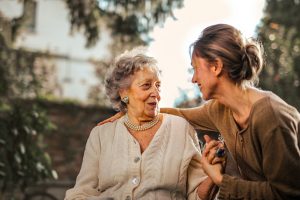 This project expands on a Volunteer Collective project currently being piloted by the South West Alzheimer Society Alliance (SWASA). The objective is to build a collective model of volunteer recruitment, training, and deployment across southwestern Ontario. The model ensures that remote communities, where volunteer recruitment is challenging, will have access to a pool of dementia-trained volunteers. Through the pandemic, the rapid introduction and adoption of virtual programming has made it possible to call on volunteers from anywhere in the region to support clients living with dementia.
This project expands on a Volunteer Collective project currently being piloted by the South West Alzheimer Society Alliance (SWASA). The objective is to build a collective model of volunteer recruitment, training, and deployment across southwestern Ontario. The model ensures that remote communities, where volunteer recruitment is challenging, will have access to a pool of dementia-trained volunteers. Through the pandemic, the rapid introduction and adoption of virtual programming has made it possible to call on volunteers from anywhere in the region to support clients living with dementia.
Pilot test and scale online dementia training for unregulated care providers adapted from the award-winning iGeriCare platform
Project Lead: Anthony J. Levinson
Organization: McMaster University (Hamilton, ON)
This project will test and scale online training about dementia and caregiver well-being for unregulated care providers. Based on the award-winning iGeriCare dementia e-learning tool, the project team has created a series of four e-learning courses that care providers can complete at their own pace. The courses cover the following core topics: foundations of dementia and mild cognitive impairment, responsive behaviours and mental health, home supports and safety, and health promotion and caregiver wellness. Progress and completion will be tracked by a learning management system. In the second half of the project, the project team will scale and spread the online training, promoting it provincially and nationally to unregulated care providers and other stakeholder organizations.
Reducing caregiver stress and uncertainty with critical decisions near end-of-life through virtual advance care planning
Project Lead: Linda Lee
Organization: Centre for Family Medicine Family Health Team (Kitchener, ON)
People living with dementia often have multiple complex medical conditions that limit their ability to express treatment preferences. Advance Care Planning discussions can reduce caregiver stress and uncertainty, while ensuring a patient’s wishes and values are honoured. Advance Care Planning has been particularly important during the pandemic since COVID-19 deaths have disproportionately affected people with dementia. To meet this urgent need, the project team has developed a virtual version of their tool Advance Care Preferences for Persons Living with Dementia. This updated tool is designed to help healthcare professionals conduct virtual care planning discussions with people living with dementia and their caregivers, or substitute decision makers, early in the course of their illness.
LiveWell@Home: Virtual GERAS DANCE to improve health and build the resilience of seniors in our community
Project Lead: Alexandra Papaioannou
Organization: Hamilton Health Sciences (Hamilton, ON)
The closing of facilities and community centres during the COVID-19 pandemic has created significant gaps in programming for older adults. Isolation increases the number of seniors at risk for falls and mental health issues. To help keep community-dwelling seniors healthy and active, this project team aims to develop a new model of care called LiveWell@Home to be delivered virtually in a senior-friendly online community. This new proposed program builds on the success of GERAS DANCE, an evidence-based, clinically proven mind and body health program for older adults.
Wet your Whistle with Water (W3): A grassroots strategy to improve water intake in residential care
Project Lead: Heather Keller
Organization: Schlegel-University of Waterloo Research Institute for Aging (Waterloo, ON)
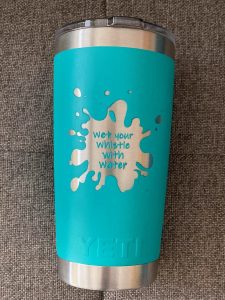
A W3 mug
Dehydration is common among older adults living in retirement, assisted living, and long-term care residences. Wet your Whistle with Water (W3) is an intervention co-designed by staff, residents, and implementation specialists to promote water intake in older adults. The program includes training materials and proven team-based strategies to support water intake developed in collaboration with Schlegel Villages staff and residents. Team members in 19 Schlegel Villages will receive training on the importance of water and hydration through an intra-net training portal. Innovation Champions, with the support of the research team, will implement team behaviour change strategies. Audits in the two test sites will be used to determine team behaviour change, health outcomes, and future program improvements.
Addressing resident and caregiver well-Being through virtual music therapy in long-term care during COVID-19 and beyond
Project Lead: Kate Dupuis
Organization: Schlegel-University of Waterloo Research Institute for Aging (Waterloo, ON)
Physical distancing and isolation measures implemented during COVID-19 in long-term care (LTC) homes have limited social interaction and recreation for residents. Additionally, increased caregiver distress is of high concern, especially for staff in LTC, whose roles and work environment have changed dramatically during the pandemic. In the current project, we will use the evidence-based power of music therapy to address two pressing issues: social connectedness among residents and caregiver well-being. We will engage with two LTC homes to systematically test our novel virtual music therapy solutions, based on the needs and resources of residents and staff. We will share our learnings with other LTC homes and music therapists in Ontario and beyond.
Supporting caregivers from ethnocultural communities through culturally appropriate tools and resources, during COVID-19 and beyond
Project Lead: Stephanie Conant
Organization: WoodGreen Community Services (Toronto, ON)
The Diverse Caregivers Access Program aims to develop, test, and deliver culturally sensitive and linguistically appropriate resources for caregivers of people living with dementia in various ethnocultural communities. The program will increase access to affordable or free resources that are co-designed with caregiver stakeholders and frontline staff. These staff members will also act as ambassadors to disseminate vital information about caregiver self-care, COVID-19, and dementia care. During the COVID-19 pandemic and beyond, this project aims to improve caregivers’ experience with health and community service navigation and access, improve quality of life, reduce caregiver burden, and provide integrated care for people living with dementia.
Advancing reminiscence therapy through virtual reality application to promote the social connectedness of persons with Dementia
Project Lead: Winnie Sun
Organization: Ontario Tech University (Oshawa, ON)
Reminiscence therapy is a multi-sensory treatment that uses a combination of sight, touch, taste, smell, and sound to help persons with dementia (PWD) remember events, people, and places from their lives. This project aims to develop an innovative framework prototype to improve the implementation of reminiscence therapy for PWD through customizable, immersive virtual reality experiences. The purpose of the study is to understand the effects of virtual reality over traditional forms of reminiscence therapy to help PWD recall memories from the past into present awareness to promote their social connectedness during the COVID-19 pandemic.
CIRCA-ON: Promoting social connection between people with dementia and caregivers
Project Lead: Arlene Astell
Organization: University Health Network (Toronto, ON)
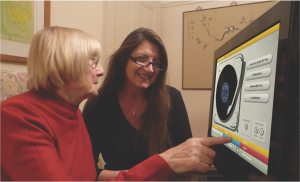
CIRCA interface.
CIRCA is a multimedia conversation support for people living with dementia and caregivers aimed at reducing the negative impact of physical distancing and lockdowns. Originally developed in the UK, this project will customize CIRCA for the Ontario population to create CIRCA-ON. With a multimedia database of photographs, music, and videoclips, CIRCA makes it easy to have face-to-face interactions. The simple CIRCA interface was developed in partnership with people living with dementia to be accessible for individuals with no technology experience. CIRCA can be loaded with content for different linguistic and cultural backgrounds.
Improving medication management for older adults in the community through caregiver supports to alleviate caregiver burden
Project Lead: Anne Max
Organization: Baycrest (Toronto, ON)
Polypharmacy, poor communication, and the body’s reaction to medication can significantly affect medication management and adherence in older adults and lead to unnecessary hospitalizations, especially for older adults with cognitive impairment. To help support safe medication use, this project will provide medication assessments to caregivers who are part of Baycrest@Home’s caregiver support services. The project will explore the use of technology (medicine dispensers) to facilitate medication management.
Guided frailty assessment: The virtual Fit-Frailty app and online portal
Project Lead: Courtney Kennedy
Organization: Hamilton Health Sciences (Hamilton, ON)
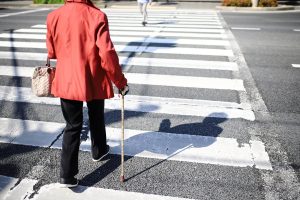 Frailty in older adults can negatively impact independence, mobility, and quality of life. The Fit-Frailty app is an e-health tool that is based on comprehensive geriatric assessments completed in geriatric clinics. A prototype of the app has been developed and piloted and is available for download on the App Store (for iPads and iPhones). Our next step is expanding the virtual Fit-Frailty app to address challenges stemming from the COVID-19 pandemic and increase access to frailty assessments in other settings, including primary care.
Frailty in older adults can negatively impact independence, mobility, and quality of life. The Fit-Frailty app is an e-health tool that is based on comprehensive geriatric assessments completed in geriatric clinics. A prototype of the app has been developed and piloted and is available for download on the App Store (for iPads and iPhones). Our next step is expanding the virtual Fit-Frailty app to address challenges stemming from the COVID-19 pandemic and increase access to frailty assessments in other settings, including primary care.
Testing online meaning-centered groups in promoting psychological well-being and reducing distress in Ontario retirement home residents
Project Lead: Marnin Heisel
Organization: Lawson Health Research Institute (London, ON)
COVID-19 has had a substantial negative impact on the health and well-being of older Canadians, a demographic with the highest proportion of fatalities nation-wide. This project will test and disseminate Online Meaning-Centered Groups (OMG) – an eight-session, scalable, psychosocial group intervention among older retirement home residents aimed at reducing perceived social isolation, feelings of anxiety and despair, and enhancing psychological resiliency and well-being.
PairingCare: Optimizing Dementia homecare
Project Lead: Angie Katherine Puerto Nino
Organization: University of Toronto (Toronto, ON)
This project is developing PairingCare, a novel dementia homecare platform through which persons living with dementia and their caregivers can connect directly with professional homecare providers. With PairingCare, recipients can benefit from a wide selection of homecare providers and vice-versa, and all users benefit from the opportunity to tailor the homecare experience for more meaningful relationships. The platform can be used collaboratively to optimize the dementia journey in various healthcare settings.
Spark-CU: Supporting Future Aging and Brain Health Innovators
Combatting loneliness in older adults through a novel sensory stimulating communication tool
Project Team: Diya Jhuti, Anabela Cotovio
School: McMaster University (Hamilton, ON)
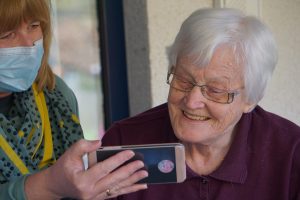 In Canada, up to 77% of bedridden older adults cannot see their loved ones’ faces when they are confined in hospitals or long-term care for extended periods of time. The lack of access to face-to-face communication tools drastically increases social isolation and loneliness. Even more concerning, this absence is known to affect the neural synchronizations that are correlated with an increased risk of cognitive decline and premature mortality. To address this issue, this project is developing a sensory stimulating communication tool to combat loneliness in older patients.
In Canada, up to 77% of bedridden older adults cannot see their loved ones’ faces when they are confined in hospitals or long-term care for extended periods of time. The lack of access to face-to-face communication tools drastically increases social isolation and loneliness. Even more concerning, this absence is known to affect the neural synchronizations that are correlated with an increased risk of cognitive decline and premature mortality. To address this issue, this project is developing a sensory stimulating communication tool to combat loneliness in older patients.
Sunshine Connected: Supporting digital literacy among older adults
Project Team: Jenna Mulji, Samantha Gardner, Aminah Beg, Sydney Grad
School: Queen’s University (Kingston, ON)
Sunshine Connected pairs older adults and students using a quiz that matches common interests, facilitating mutually beneficial conversations and strong intergenerational relationships. In its next phase, this project will introduce pre-recorded and live workshops (including workshops that are older adult-led) to support digital literacy among older adults.
Community-based social connectedness program to reduce loneliness among older adults living in Ontario
Project Team: Neerjah Skantharajah, Rabail Siddiqui, Joanna Law, Carly Thrower
School: University of Toronto (Toronto, ON)
This project will use peer-reviewed research from experts in the geriatric field and reports on the lived experiences of seniors to deliver community-based programming designed to reduce loneliness in adults aged 65 and over living in Ontario.
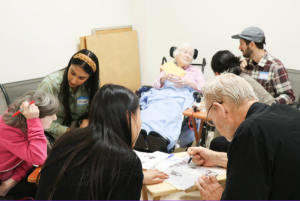 Using multigenerational storytelling to create connections
Using multigenerational storytelling to create connections
Project Team: Aranza Zuniga, Sheri Burke
School: Seneca College (Toronto, ON)
This project will pair older adults and persons with disabilities (PwD) with young people to decrease social isolation and improve brain function through the use of skill development and storytelling. The project will consist of a series of workshops that will support reading, writing, and digital literacy skills among participants. The long-term goal is to scale this project and target a wider geographic audience.
Memorias-Community: Building community for older adults and those living with dementia
Project Team: Sneh Patel, Shuayb Badoolah, Laura Gonzalez
School: Sheridan College (Oakville, ON)
Memorias-Community is a tablet app that connects older adults and individuals living with dementia through brain training games and a socialization platform.
Bridging communication across generational, cultural, and language divides among Chinese-Canadians
Project Team: Christine Chung
School: OCAD University (Toronto, ON)
This research project intends to support intergenerational communication by implementing inclusive programs that will address common themes and pain points among older first generation Chinese-Canadians and children of Chinese immigrants.

